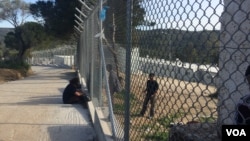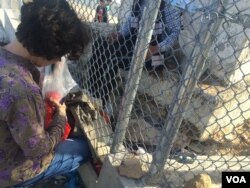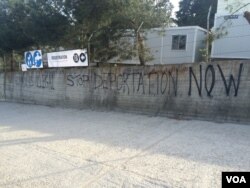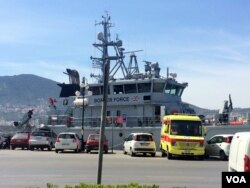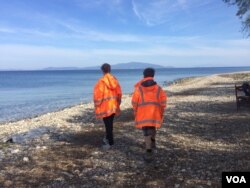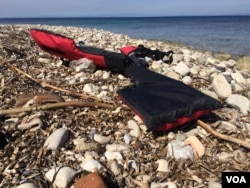Men lounge on concrete slabs a few meters from the barbed-wire-topped chain-link fence that surrounds this center in Lesbos, Greece. It was once a refugee camp. But now the inhabitants are more like inmates, unable to leave if they chose to.
Police watch passers-by warily, occasionally shooing away the occasional journalist or aid worker who stays too long.
I say “good evening” in Arabic as I walk by one group. At least five young men jump up, eager to talk, despite my limited language skills.
“What is going to happen to us?” asks Mohammad. He’s heard hundreds of people will be plucked from this camp and deported to Turkey in the coming days as part of the European Union’s plan to reduce migrant flows.
From there, where will they go? A Turkish “camp” where they will be locked inside? Will he be sent back to his home city, Der Ezzor, an Islamic State stronghold where he surely will be killed?
I don’t know, either, so I ask the group what they think will happen.
“I’m going to Germany, or Austria or Sweden,” one man calls out through the fence. “My house in Syria was destroyed. There is nothing there for me.”
Determined to go
They know the border to Macedonia is closed, and they know Western Europe is trying to stop migrants. But like more than a million people who came before them, they still want to go, despite the obstacles.
But with literally no information, they are not sure what the next step is. One man has an idea. “What is the name of this island?” asks Abdulrahman, Mohammad’s younger brother. Several men chime in.
“And the area is called Moria?” one man asks. I tell them this is Lesbos island, whose main city is Mytilini, and confirm that they are indeed in Moria. I hear one man quickly get on his mobile phone to report his whereabouts. He asks me to write the names in Arabic so he won’t forget.
Security forces now run the camp after most aid organizations quit in protest of the European Union-Turkey deal aimed at curbing the migration of refugees toward Europe. The inhabitants, all here for several days already, do not even know where they are. Right now, they are more concerned with where they are going.
Graffiti outside the camp read: “No human is illegal” and “Stop deportation now!”
New arrivals
Last fall, new arrivals in Lesbos would report to the camp to get papers, and then get on a boat to Athens as soon as possible, the next leg of their journey toward Western Europe.
Passports were barely checked, and the process was swift. Refugees often chose to sleep by the port for a night or two, rather than in the camp about 10 kilometers away. The streets and shops were packed with refugees and other migrants. After the terrorist attacks in Paris in November, lax security in Greece was roundly condemned.
Now refugees arrive in a more orderly — if frightening — fashion. Many boats are intercepted by the Greek coast guard, and refugees are brought directly to the port where they load onto buses to the camp. Those who reach the shore are met by the buses shortly after their arrival.
“Can you imagine coming across the sea on a rubber boat and being met by a warship?” asks Fabenne Fahrni, a volunteer for Swiss Cross, as she stands on the beach scanning the sea for arriving rubber boats to provide passengers with such things as emergency blankets and dry socks.
Like other volunteers, she and her colleague, Simon Gerber, stay on the beach in shifts of up to 12 hours, hoping to help the people that they can, while they can.
“It’s not humanitarian,” says Gerber, echoing the sentiment of aid workers worldwide, including the U.N. High Commissioner for Refugees and the French aid agency Doctors Without Borders — all repelled by the deportation plan, yet unable to stop it.
Harsh conditions
At the camp, police let me talk for about 20 minutes before they insist I move along. The men say hundreds of new people are arriving daily, crowding the packed center that already holds thousands.
Some new arrivals say they sleep in rooms with as many as 50 people squished up against each other. Others sleep outside because the rooms are full.
Mohammad shows me his lower leg, slightly crooked, swollen and decidedly purple. “From the war,” he says, showing me the medicine the camp doctor gave him, the medicinal equivalent of an aspirin.
Other men chime in with a cacophony of health concerns. Rebaz shows me a doctor’s note detailing the prescribed follow-up on the brain tumor operation he received in Kurdish Iraq. If this man goes back, it’s not just the war that may end his life.
The harsh conditions, however, are the least of their concerns. They expected the journey to be difficult and expensive, but after Europe accepted so many people last year, they did not expect the West to turn its back on them now.
I did not get a chance to ask them how they feel about the refugee policy of the United States, which granted asylum to fewer than 2,000 Syrians in 2015.
“We cannot return,” says Mohammad. “Islamic State militants took everything. Everything is gone. They are cutting off heads.”




